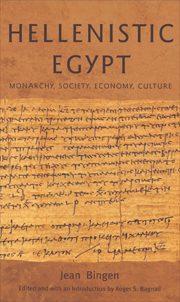Book contents
- Frontmatter
- Contents
- Original Sources of Chapters
- List of illustrations
- Glossary
- Maps
- Foreword
- Introduction: Jean Bingen and the currents of Ptolemaic history
- Part I The Monarchy
- Part II The Greeks
- Part III The Royal Economy
- Part IV Greeks and Egyptians
- Conclusion
- Bibliography
- General index
- Index of passages discussed
- HELLENISTIC CULTURE AND SOCIETY
Foreword
- Frontmatter
- Contents
- Original Sources of Chapters
- List of illustrations
- Glossary
- Maps
- Foreword
- Introduction: Jean Bingen and the currents of Ptolemaic history
- Part I The Monarchy
- Part II The Greeks
- Part III The Royal Economy
- Part IV Greeks and Egyptians
- Conclusion
- Bibliography
- General index
- Index of passages discussed
- HELLENISTIC CULTURE AND SOCIETY
Summary
Sixty years ago, on 8 May 1945, in our barracks, we did not perceive in ourselves much more than a never-again feeling that five years of nightmares were behind us and that, back home, things would be soon settled in the good old way. We did not realize that we were living the first day of the third millennium. I recall this here because, if the present collection offers any original features, that is due less to me than to the fact that these articles were written some time after such a break-point of history. What I had learned as a student before that from those who first guided my thinking, the works of the prestigious Wilcken and the comfortable Rostovtzeff as much as the Économie royale des Lagides published in 1939 by my young professor, Claire Préaux, had been elaborated on the other side of the century divide, before the crisis which forced us to think otherwise, even unconsciously – with, among others, people like Moses Finley or Pierre Vidal-Naquet.
Some weeks later, Private Bingen, on leave, defended in khaki his doctoral thesis on the so-called Revenue Laws. The dissertation was rather shy, drafted in a time when it was as difficult to find carbon paper for the five copies required by the university as to obtain free moments to concentrate on a rather untimely activity. During the discussion of the thesis, mainly a long dialogue with Claire Préaux, I perceived a rift between what I had written not so long ago and what I was proposing to my jury. I felt quickly that my essay was somehow outdated, and later I refused to have it printed when this luxury had again become possible.
- Type
- Chapter
- Information
- Hellenistic EgyptMonarchy, Society, Economy, Culture, pp. xix - xxPublisher: Edinburgh University PressPrint publication year: 2007



